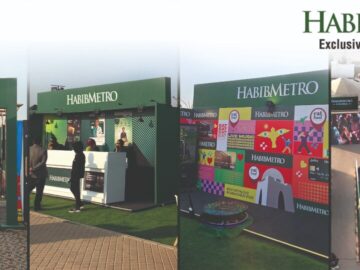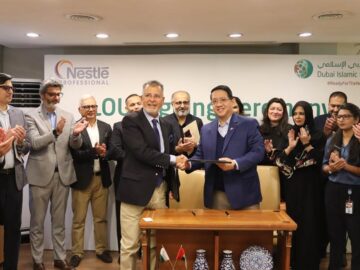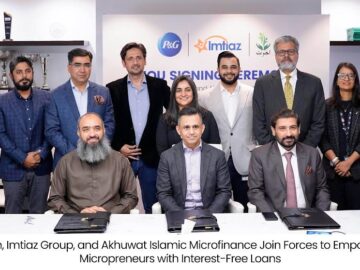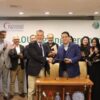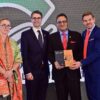
DBS announced plans to transform a patch of outdoor space at its DBS Asia Hub building in Changi Business Park into what is believed to be Singapore’s first community farm located in a bank. In doing so, the bank hopes to create accessible, hands-on farming opportunities at the workplace and help nurture a new crop of citizen farmers among its employees.
Dubbed the DBS Food Forest, the community farm was conceptualized in partnership with Edible Garden City, a social enterprise supported by DBS Foundation that has developed over 240 food gardens over the past seven years.
Currently scheduled for completion by the end of 2020, the Food Forest is expected to sustain over 50 varieties of edible plants and herbs that Singaporeans consume every day. They range from vegetables such as sweet potato leaves and watercress to fruits such as papaya, starfruit and calamansi, and herbs such as galangal, lemongrass, and laksa leaves.
Bringing the farm-to-table concept into the workplace, DBS plans to work with DBS Asia Hub’s in-house cafeteria whose chefs will turn the harvests from the Food Forest into freshly-cooked meals for the bank’s employees. Having a supply of produce close by also reduces the number of trips that suppliers need to make to deliver ingredients to DBS premises. This not only helps reduce transport costs but also contributes to the lowering of carbon emissions.
In line with the bank’s vision of a future with zero food waste, the Food Forest will also include an on-site composting system, which will convert organic waste generated by the in-house cafeteria into organic fertilizer. This is then used to enrich the soil of the Food Forest for the next harvest, completing the cycle from crop to compost. For a start, compost derived from coffee grounds that the bank collected at last year’s Singapore FinTech Festival will be used to fertilize the soil of the Food Forest when it first opens. This is an extension of DBS’ current practice of using coffee grounds from its in-house cafes as fertilizer for all greenery in its premises.
The Food Forest will be tended by the bank’s own employees, who will be involved in activities such as weeding, maintenance, and harvesting. They will be supported by experts from Edible Garden City.
Shee Tse Koon, DBS Singapore Country Head, shared that while DBS has supported the development of sustainable food systems as part of its approach to responsible banking, the Covid-19 situation has led to a greater appreciation of the need to optimize our resources to enhance food security. The DBS Food Forest ticked all the right boxes for the bank, in terms of sustainability, responsible business practices, green design, employee engagement, as well as the productive use of space. “By bringing food production right to the workplace, we hope to get our employees interested enough in urban farming to be involved in one of the more than 1,500 community gardens[1] across our housing estates or to even try their hand at growing small batches of crops in their own home. Our aim is to spark a virtuous circle, with our employees positively influencing their families and friends, which in turn leads to more edible gardens blooming across the island. We believe that small steps can make a big difference, and we want to spark change by raising the community’s awareness of the amount of effort needed to grow what we eat, and ultimately foster a more mindful approach towards food.”
Additionally, the Food Forest will include many carbon and resource-conserving features. For instance, waste wood chips and shavings will be compacted into ‘bricks’ to line the footpaths in the Food Forest. A water-efficient drip irrigation system will be deployed to keep plants hydrated, with an automatic timer attached to the water source to prevent unnecessary watering and wastage.
Going forward, DBS plans to propagate more such community farms across its various office locations in Singapore and in the region, building on the learnings gleaned from developing and managing the Food Forest in Singapore.
Samuell Ang, Chief Executive Officer of Edible Garden City, said, “DBS has been a longstanding partner in our growth, and we’re pleased to be able to work with the bank in bringing their very first community farm to life. Community farms are a vital touchpoint for the public to learn more about farming and to get involved in growing their own food. While they are increasingly common in housing estates and shopping malls, it’s not often you find one in a commercial space. We hope that more businesses and developers will be inspired by DBS’ efforts and that in the near future we can see similar farms blossoming across commercial properties and business parks.”
Loh Lay Kwan, Vice President for Sustainable Operations at DBS, has been finding her green thumb now that she has been spending more time at home amid Covid-19. Over the past few months, she has grown kangkong and various herbs right from her balcony and is looking forward to working on the Food Forest in her spare time when the pandemic situation improves. “I find gardening to be very therapeutic, and it gives me a sense of calm with everything going on in the world today. With the Food Forest, I will be able to literally put food on the table by doing something I enjoy, and I find that to be really meaningful. I’ve not tried growing such a wide range of fruit and vegetables before so this will certainly be a new and exciting experience!”



